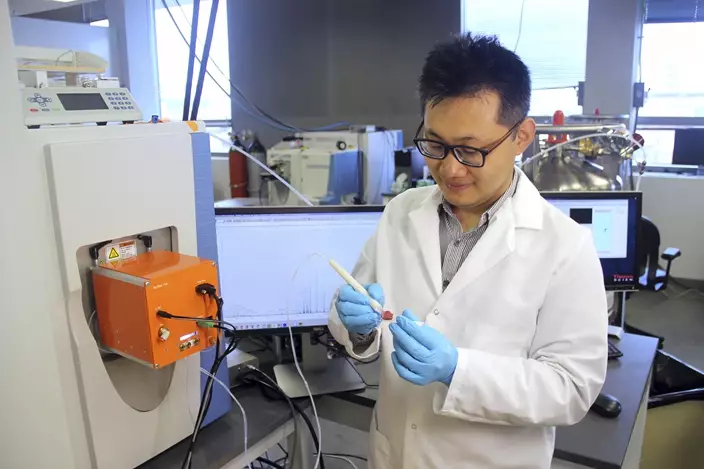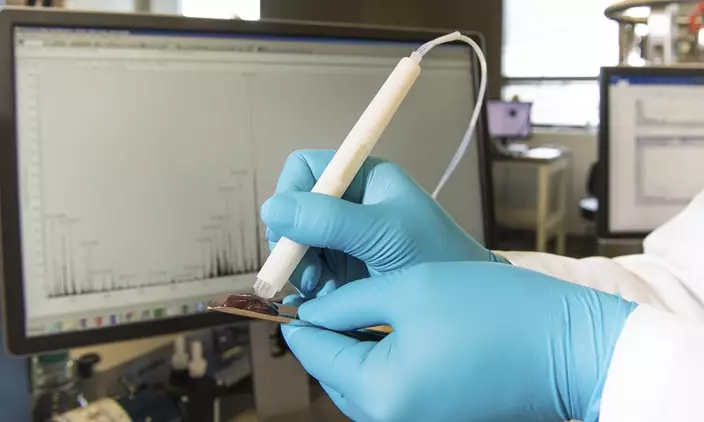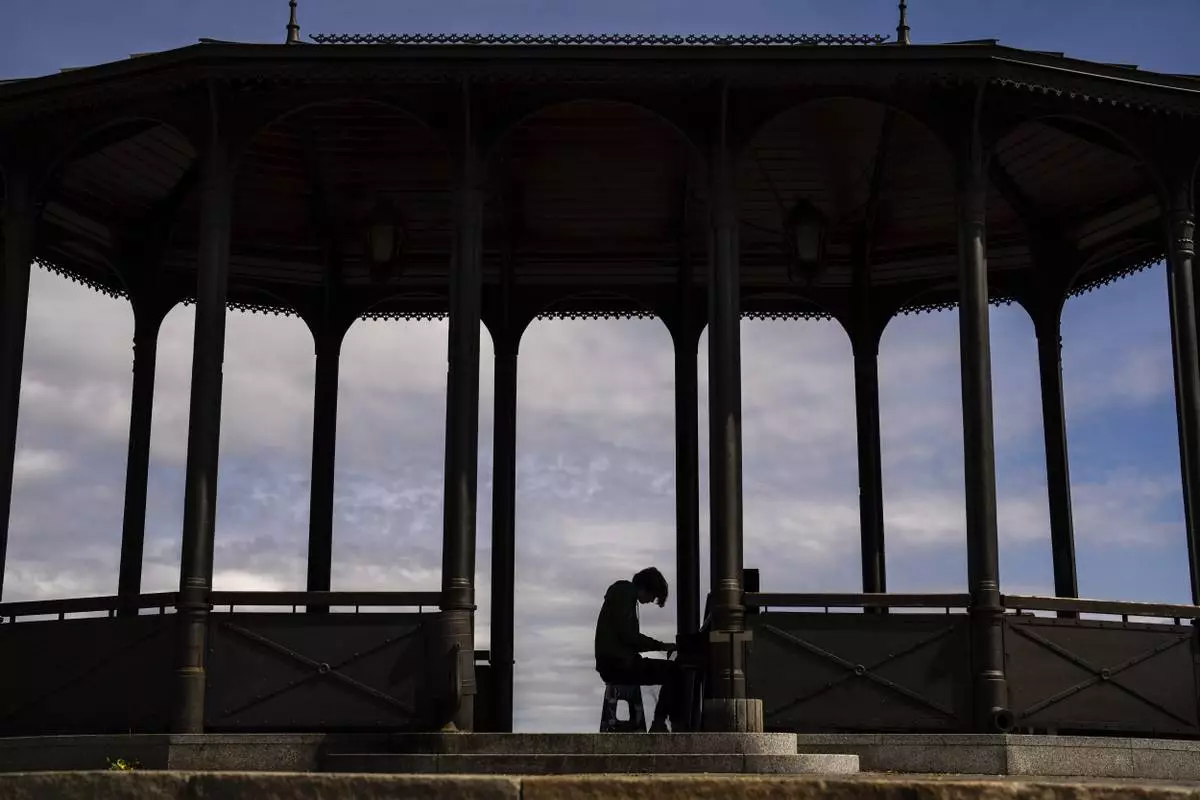Patients emerging from cancer surgery want to know, "Did you get it all?" Now scientists are developing a pen-like probe to help surgeons better tell when it's safe to stop cutting or if stray tumor cells still lurk.

This photo provided by the University of Texas at Austin, shows scientist Jialing Zhang as he demonstrates using the MasSpec Pen to analyze a human tissue sample. (University of Texas at Austin via AP)
The device is highly experimental, but laboratory tests show it uses molecular fingerprints to distinguish between cancerous cells and healthy ones far faster than today's technology, Texas researchers reported Wednesday.
"That's really anyone's worst nightmare, to go through surgery and know there's a chance" some cancer remains, said assistant chemistry professor Livia Eberlin of the University of Texas at Austin, who is leading the work. "By providing real-time molecular information, we could really improve accuracy."
Her team aims to begin testing the device during surgeries, starting with breast cancer, early next year.
When surgeons think they've removed all of a tumor, they often also remove a thin layer of surrounding tissue, called the margin, to be sure no cancer cells linger at the edge and increase the risk of relapse.
The problem: That check takes time, for pathologists to process the tissue and examine it under the microscope. For certain especially tricky tumors, surgeons sometimes pause for a half-hour to more than an hour, the patient still under anesthesia, to await the results. For breast cancer and certain other types, often the answer doesn't arrive until a few days after surgery, raising the possibility of repeat operations.
In contrast, "our device is able to give an immediate read-out in under a minute," said UT research engineer Noah Giese.
How it works: Cells produce unique sets of small molecules that perform various functions — and thus also act as fingerprints. Researchers place the pen-like device directly onto tissue, press a foot pedal to switch it on, and a tiny amount of water emerges to gently pull molecules from the cells in that spot.

Scientists are developing a highly experimental pen-like probe to help surgeons better tell when it's safe to stop cutting or if stray tumor cells still lurk. (University of Texas at Austin via AP)
A tube carries the droplet to a machine called a mass spectrometer that identifies molecules by calculating their mass. Software then immediately analyzes whether the resulting fingerprint matches cancer or healthy tissue.
In lab tests of samples that had been taken from 253 patients with lung, ovary, thyroid or breast tumors, the so-called "MasSpec Pen" was more than 96 percent accurate in diagnosing cancer, researchers reported in the journal Science Translational Medicine. They also successfully used the pen during a handful of operations on mice.
"It's intriguing technology," said Dr. Nita Ahuja, chief of surgical oncology at Johns Hopkins Medicine, who wasn't involved in the work.
Surgeons need new tools to catch residual cancer in the operating room, and developing molecular techniques to try is a hot new field, Ahuja said. While she stressed that the hand-held pen needs lots more research to prove if it really works, she said it might be easier to use than some other candidates under development.
If it pans out, doctors would have to place the pen on multiple spots to check an entire wound. Researchers noted it doesn't appear to harm tissue, meaning pathologists still could double-check with standard techniques when human testing begins.
KYIV, Ukraine (AP) — A Ukrainian court on Friday ordered the detention of the country’s farm minister in the latest high-profile corruption investigation, while Kyiv security officials assessed how they can recover lost battlefield momentum in the war against Russia.
Ukraine’s High Anti-Corruption Court ruled that Agriculture Minister Oleksandr Solskyi should be held in custody for 60 days, but he was released after paying bail of 75 million hryvnias ($1.77 million), a statement said.
Ukraine’s National Anti-Corruption Bureau suspects Solskyi headed an organized crime group that between 2017 and 2021 unlawfully obtained land worth 291 million hryvnias ($6.85 million) and attempted to obtain other land worth 190 million hryvnias ($4.47 million).
Ukraine is trying to root out corruption that has long dogged the country. A dragnet over the past two years has seen Ukraine’s defense minister, top prosecutor, intelligence chief and other senior officials lose their jobs.
That has caused embarrassment and unease as Ukraine receives tens of billions of dollars in foreign aid to help fight Russia’s army, and the European Union and NATO have demanded widespread anti-graft measures before Kyiv can realize its ambition of joining the blocs.
In Ukraine's capital, doctors and ambulance crews evacuated patients from a children’s hospital on Friday after a video circulated online saying Russia planned to attack it.
Parents hefting bags of clothes, toys and food carried toddlers and led young children from the Kyiv City Children’s Hospital No. 1 on the outskirts of the city. Medics helped them into a fleet of waiting ambulances to be transported to other facilities.
In the video, a security official from Russian ally Belarus alleged that military personnel were based in the hospital. Kyiv city authorities said that the claim was “a lie and provocation.”
Kyiv Mayor Vitali Klitschko said that civic authorities were awaiting an assessment from security services before deciding when it was safe to reopen the hospital.
“We cannot risk the lives of our children,” he said.
Meanwhile, Ukrainian President Volodymyr Zelenskyy was due to hold online talks Friday with the Ukraine Defense Contact Group, which has been the key international organization coordinating the delivery of weapons and other aid to Ukraine.
Zelenskyy said late Thursday that the meeting would discuss how to turn around Ukraine’s fortunes on the battlefield. The Kremlin’s forces have gained an edge over Kyiv’s army in recent months as Ukraine grappled with a shortage of ammunition and troops.
Russia, despite sustaining high losses, has been taking control of small settlements as part of its effort to drive deeper into eastern Ukraine after capturing the city of Avdiivka in February, the U.K. defense ministry said Friday.
It’s been slow going for the Kremlin’s troops in eastern Ukraine and is likely to stay that way, according to the Institute for the Study of War. However, the key hilltop town of Chasiv Yar is vulnerable to the Russian onslaught, which is using glide bombs — powerful Soviet-era weapons that were originally unguided but have been retrofitted with a navigational targeting system — that obliterate targets.
“Russian forces do pose a credible threat of seizing Chasiv Yar, although they may not be able to do so rapidly,” the Washington-based think tank said late Thursday.
It added that Russian commanders are likely seeking to advance as much as possible before the arrival in the coming weeks and months of new U.S. military aid, which was held up for six months by political differences in Congress.
While that U.S. help wasn’t forthcoming, Ukraine’s European partners didn’t pick up the slack, according to German’s Kiel Institute for the World Economy, which tracks Ukraine support.
“The European aid in recent months is nowhere near enough to fill the gap left by the lack of U.S. assistance, particularly in the area of ammunition and artillery shells,” it said in a report Thursday.
Ukraine is making a broad effort to take back the initiative in the war after more than two years of fighting. It plans to manufacture more of its own weapons in the future, and is clamping down on young people avoiding conscription, though it will take time to process and train any new recruits.
Jill Lawless contributed to this report.
Follow AP’s coverage of the war in Ukraine at https://apnews.com/hub/russia-ukraine

Ukrainian young acting student Gleb Batonskiy plays piano in a public park in Kyiv, Ukraine, Thursday, April 25, 2024. (AP Photo/Francisco Seco)












